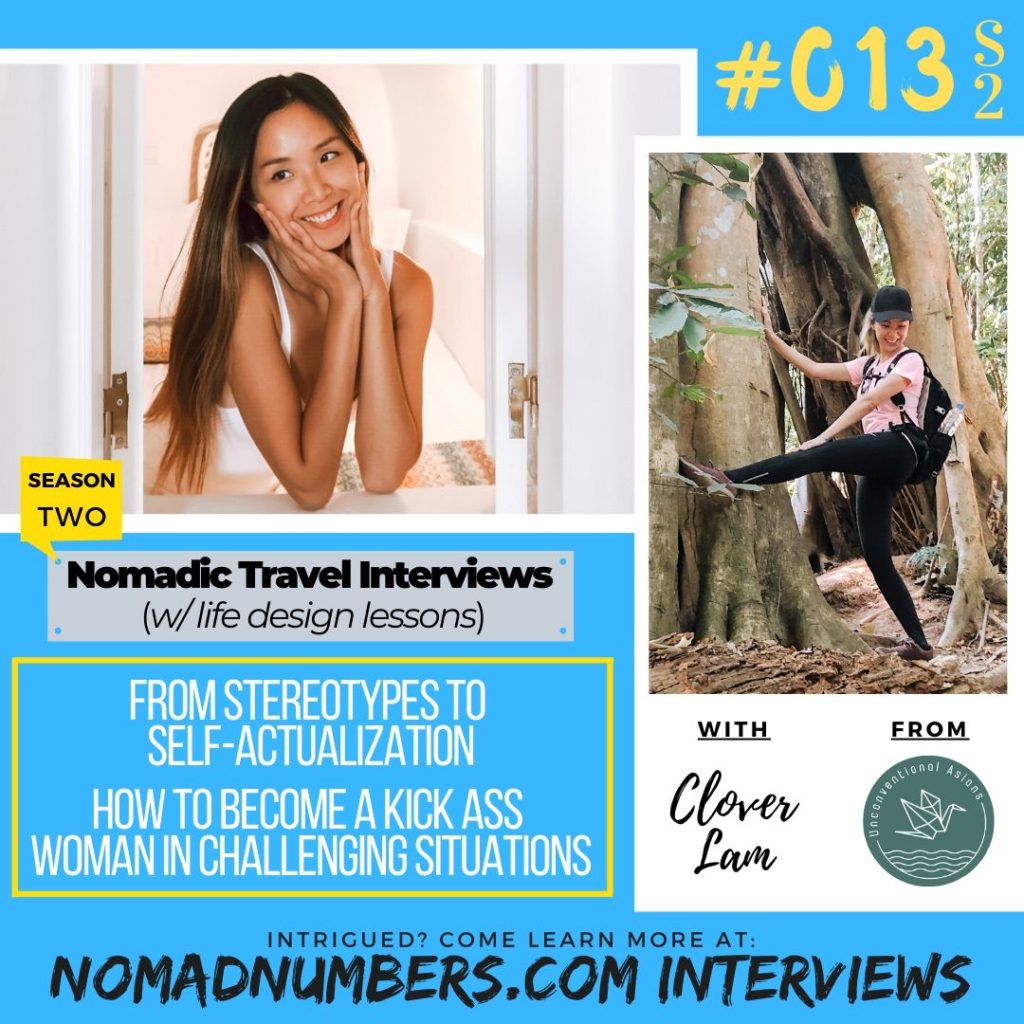
This interview is part of our interview series, where we curate stories of regular people that decided to design a life they love. (click here to learn more).
Clover from SimplyCloverLiving.com
Clover is a 36 years old flight attendant who resides in Canada. She was born in Hong Kong and came to Canada when she was 13, but has called Toronto her home ever since.
I discovered Clover via her fascinating story that was published on the Millenial-Revolution.com blog. Her story resonated so much that I quickly connected with her through social media where we exchanged information about the nomadic lifestyle. Little did I know that this active and energetic girl was just at the beginning of a much larger transformational journey that we will be discussing in this interview.
I also wanted to have her on our interview series because of her ethnicity, gender and relationship status which all together already come with some stereotypes that will quickly be dismissed because Clover’s hardest challenges in life is what ultimately has led her to live the life she has chosen to live today.
Without further ado, let’s hear from Clover Lam.
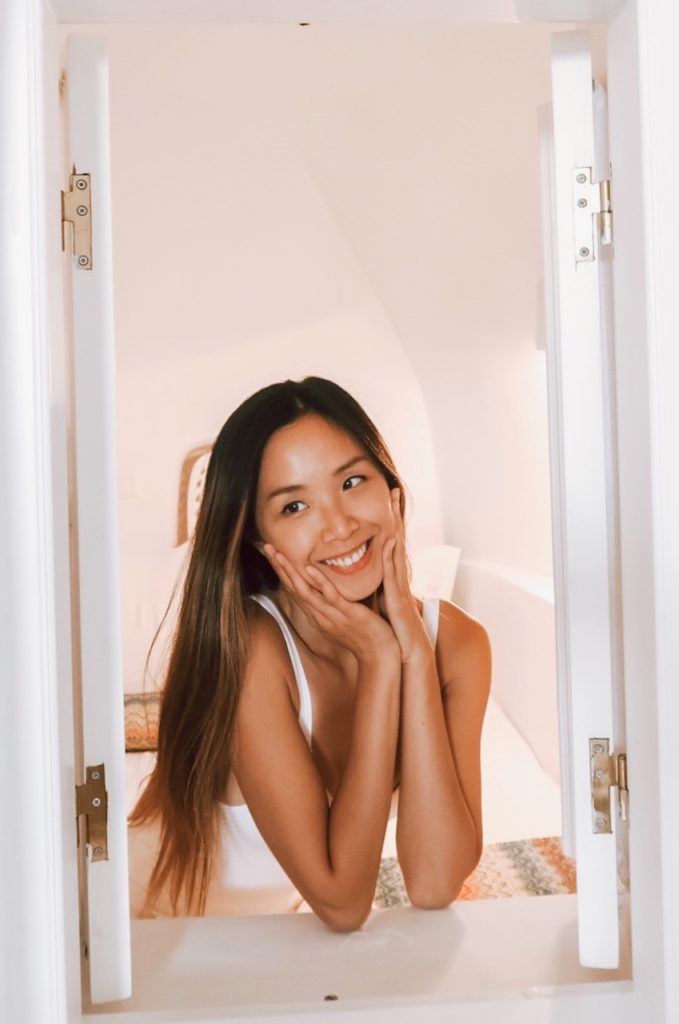
Some links to the products mentioned below are affiliate links, meaning that if you click and make a purchase, we (Nomad Numbers) may receive a commission at no additional cost to you. For more information please review our disclaimer page.
- What does a typical day in your life look like for you today? How does it differ from your lifestyle before?
Clover: The typical day for me is that there is no typical day!
Pre-COVID, when I was traveling a lot, I would usually explore the town, try out restaurants and cafes, and do some adventurous activities such as hiking, swimming, and walking tours. I always meet people on my travels, so I would go to excursions or hang out with them. Every day was different and an adventure.
After COVID-19, I realized my love of traveling is actually about self-actualization. Since I met so many interesting people on my travels, they are the ones I am now interviewing on my channel to have real talks about the ups and downs we face, and the lessons we learned along the way. This phase of my life is now about giving back and sharing the experiences I learned.
Therefore, I am now working every day, for free. I start the day with meditation, followed by a run, then cook and eat breakfast. I would either film and edit my videos, do interviews, network with people in the afternoon, most days, I also go for walks and listen to podcasts related to personal development during my free time. I would read and do courses pretty much any other time I am not working on my brand. Learning fuels me. At night, I cook and have a nice homemade meal. And finish off the night with meditation.
I don’t really count weekdays or weekends ever! Life is a giant vacation!
IMPORTANT NOTE: this interview was done before COVID-19 was declared a pandemic. We have worked with our guest to adjust the relevant sections of our interview to include any “post-pandemic updates” as well as providing a general update you can read below.
Clover: Since the whole COVID-19 situation, my life has definitely taken a drastic turn, but here is a breakdown of the different stages:
Pre-nomadic shift: I only worked 10 days a month, and traveled about 2-3 times a year on vacations. I am a homebody, so the rest of my days off, I’m just reading or researching on where to go next!
Post-nomadic shift and pre-COVID-19: I sold my condo to rent a room, to free up the resources to travel on my days off. I’d be home around 5 days a month to maximize my time on experiencing the world and pushing outside my comfort zones. I still did a lot of reading and researching in transit or sitting in cafes around the world.
During COVID-19: I am now temporarily laid off from work. Therefore, I am home every day, which is the complete opposite of my lifestyle before COVID-19. However, I think this was a blessing in disguise because it allowed me so much time to work on the brand that I’m building called Unconventional Asians, where we feature stories from Asians who live on their own terms, and how they filter the noise and expectations from society and culture. To inspire each other to live an authentic life.
Finding my passion has fuelled me just like traveling did. So sitting at home this time around was just as fulfilling as my traveling days!
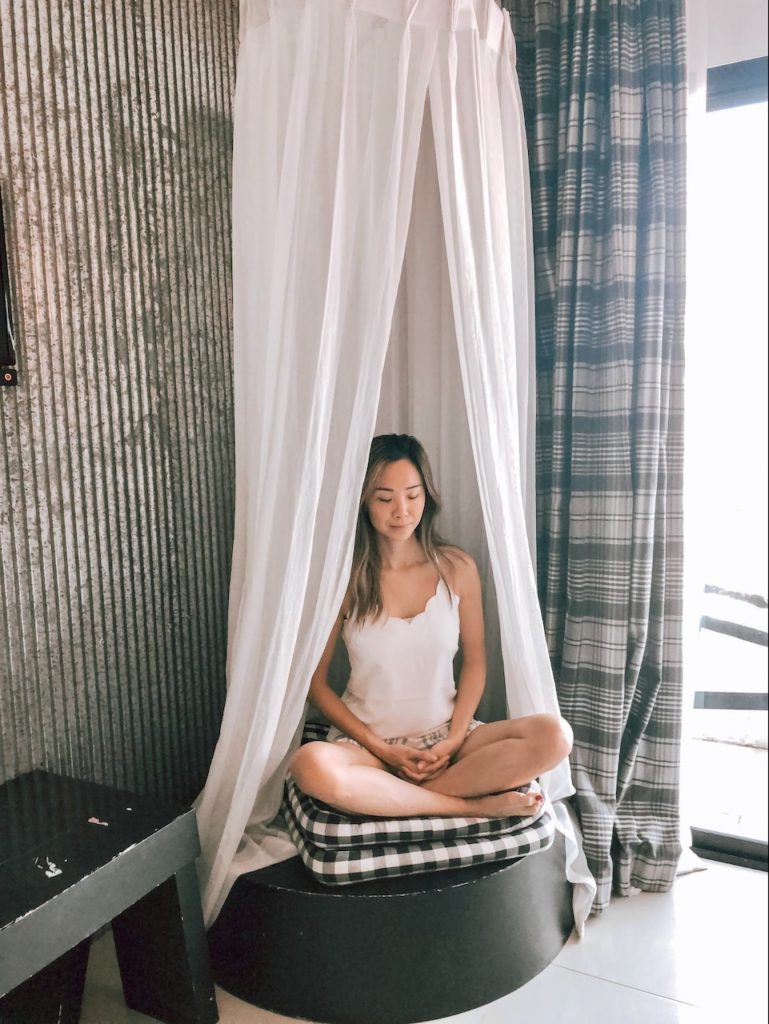
Life design journey
2. What inflection point led you to decide to change your life trajectory?
Clover: Since I am a flight attendant, I was lucky enough to have a lot of time off and travel benefits. Since my divorce, I realized how much traveling can do for my self-growth. I fell in love with traveling so much that I wanted to find a way to do it more often, but also make it financially sustainable. I also believe in planning for my retirement, so I had to find a balance. Therefore, I sold my condo to rent a room, which frees up $1,500 CAD a month for me to either travel or save towards my goal of financial independence. I put my equity towards investing in index funds as my retirement portfolio. This way, it gives me the freedom to travel without being tied down to property and maintaining it. Plus, I am still responsibly for growing my money for the future.
COVID-19 Update: I don’t know what the future will hold for me yet, but I’ll still include living aboard. Depends on how long I’ll be laid off, I might have to stay in Canada for the first year as I collect government assistance. After that, I’d bootstrap and work out of Southeast Asia as I build my brand. Since I have two years of financial runway without additional income. If I’m recalled back to fly, I’d still be semi nomadic, but travel to interview people all over the world.
3. What were some of the limiting beliefs that hold you back initially?
Clover: I never thought I was capable of travelling on my own. I wasn’t interested in travelling to places outside of Asia back then, because I was in my comfort zone surrounded with familiar faces and culture of my own. I didn’t think I would be smart enough to figure out finances as a woman who absolutely loathes math. Since my divorce, that was the pivotal moment where I decided to take charge of my own life. The first time I travelled to Hawaii on my own, I promised myself I would do everything that scared me. I wouldn’t let myself think of backing out. I swam with sharks, I sat at a bar by myself. I rode on a trikke, and I don’t know how to ride a bicycle! I was the only single person on a ziplining trip surrounded by couples on their honeymoons. Ever since that trip, I got comfortable being uncomfortable.
After almost 2 years of travelling to so many places and expanding my horizons, I decided to take the leap and began my semi-nomadic journey. Even during that time, I was terrified if I made the biggest mistake to “recklessly” sell my condo and just travelled. But I have to trust the math and also stay true to my values of living life with no regrets.
4. What did you do to prepare the transition to this new destination and how did you do it?
Clover: Always being on the road could be tiring, especially when I already travel for a living. Therefore, I rest as much as I can during my time off and on layovers. I have also minimized my packing to carry-on only, which limits how much I can purchase when I am travelling. It’s an adjustment, but it’s definitely a beneficial one!
5. Once on the journey, what were some of the biggest challenges you have to face along the way?
Clover: Staying true to my desires to travel and become a semi-nomad instead of listening to the naysayers who think it is irresponsible for me to sell my condo to travel the world. I had to trust that I’ve done the numbers right and I CAN have the best of both worlds.
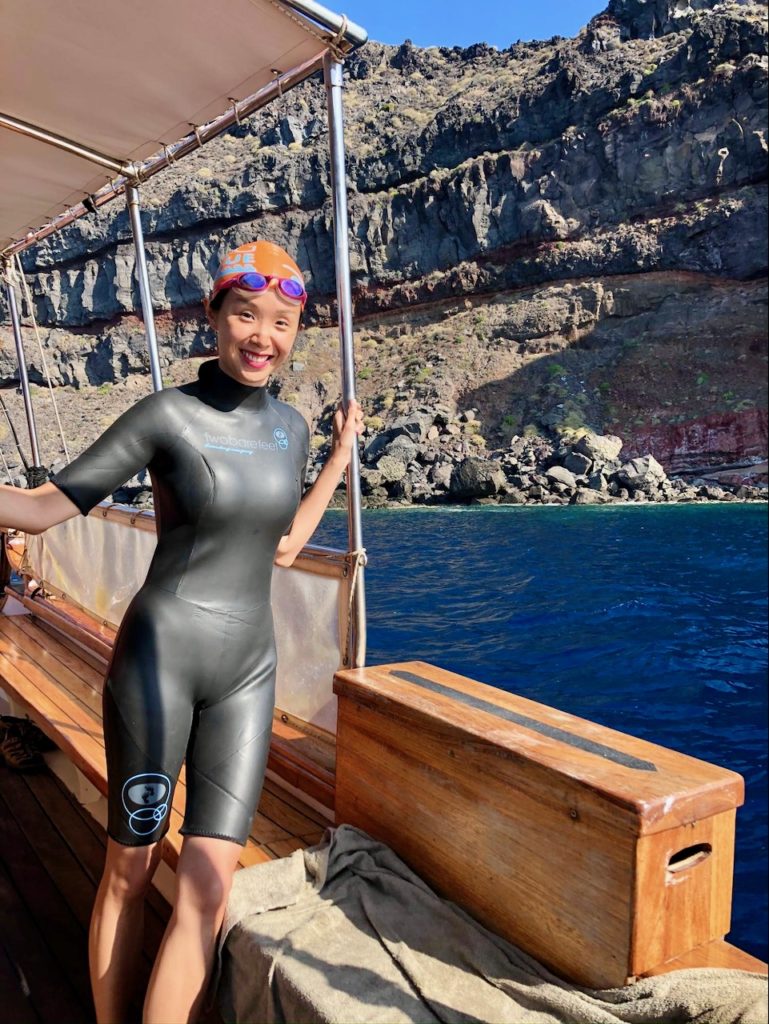
6. What life philosophy has been guiding you through this journey?
Clover: I believe life is too short, and we are never guaranteed another day, so it’s important to live it to the fullest, but also be responsible for planning for the future. It’s great to enjoy the present moment, but it has to be a balance, just in case I live to 100!
7. How long will it take you to become financially free? Why prompted you to reach FI?
Clover: Before the COVID-19 situation, I was aiming for 12 years before I could reach FI. However, this might be delayed because of temporary layoff. It could also be accelerated because I’m building a brand that will be monetized. Building a business is a process and it’s hard to put an estimate on it. However, I will most likely also start coaching on the side as well. So this can go either way!
I wanted to reach FI because I wanted to relieve the pressure of having to rely on an income because you never know what will happen. And what’s happening right now is a testament that everything is unpredictable.
8. What did the people around you (friends/family/colleague…) think of your plan to take on this new life?
Clover: Most of my friends are very supportive and inspired by my choice. Some are skeptical as it is quite different from their values of security and stability, but hey, to each their own! My mom is cool about it, as she is quite open-minded herself, but as a mom, she sometimes worries about me, but I make sure I update her on what’s happening. My dad on the other hand is more security driven, so he was against my decision to sell my condo to rent a room , but I have always been an independent thinker and made unconventional choices, so far I turned out fine, so my parents just trusted me, which gives me a lot of freedom and independence.
9. What changes did you have to make to you day to day since the COVID-19 pandemic started?
Clover: Since I’m now temporarily laid off, I am currently receiving government assistance. However, I’ve dramatically decreased my spending to a point where I still have a 30% saving rate! There might be no more travelling at the moment but I’m doing something I’m very passionate about and hopefully it’s meaningful and impactful for my audience, so I actually feel very fulfilled and grateful for this blessing in disguise.
Travel
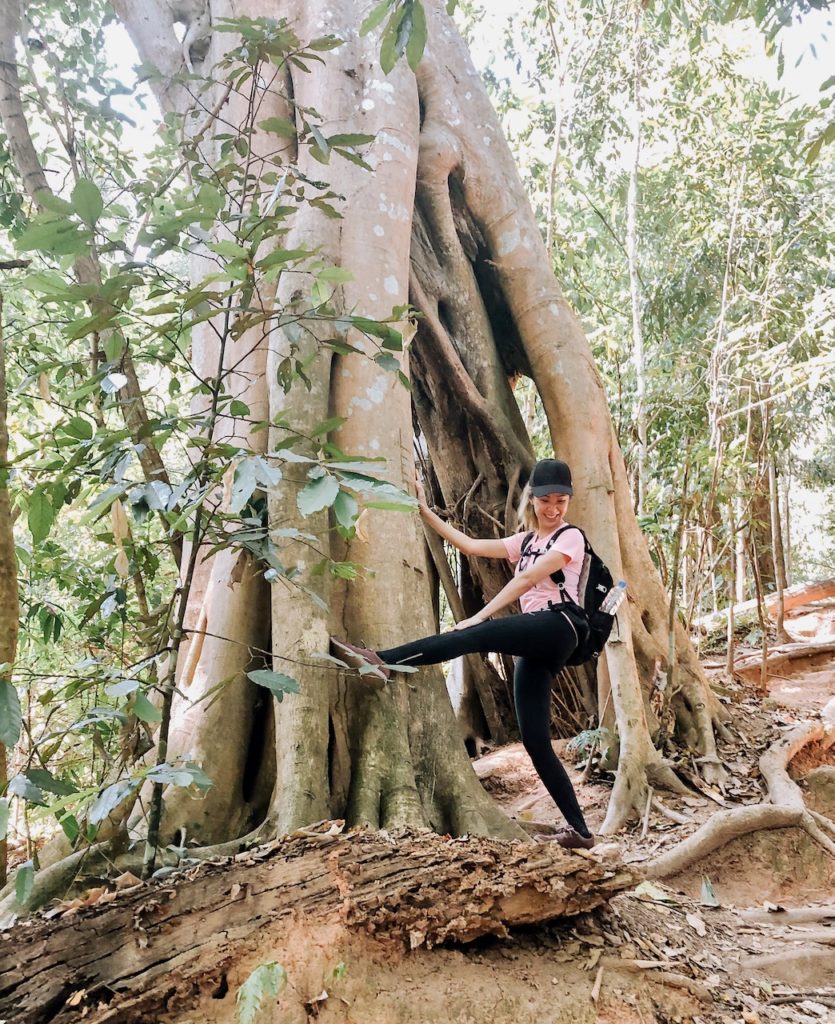
10. How would you describe your travel style?
Clover: Flashpacking and adventurous. I don’t necessarily love staying in hostels because I want my privacy. But I like to meet people and the affordable prices. So I usually stay at airbnbs or guest houses that are on the lower end of prices, but clean and central to everything. I also enjoy outdoor and adventurous activities that push me outside my comfort zone.
11. How much stuff do you travel with?
Clover: I travel with a 40L backpack, and a 18L daypack for my laptop, and miscellaneous items.
12. Now that travel is pretty much on pause in most countries (including Canada), how do you see travel for the rest of the year?
Clover: I currently reside in Toronto. However, I might relocate to Vancouver in the fall to be closer to the community of content creators to build my brand. When travel restrictions lift, I would ideally become a digital nomad. Our goal is to do live interviews all over the world, to gather enough data from all different perspectives of Asians so we can understand our roots, and from there become aware of the cultural conditioning and free ourselves from them if we choose to do so.
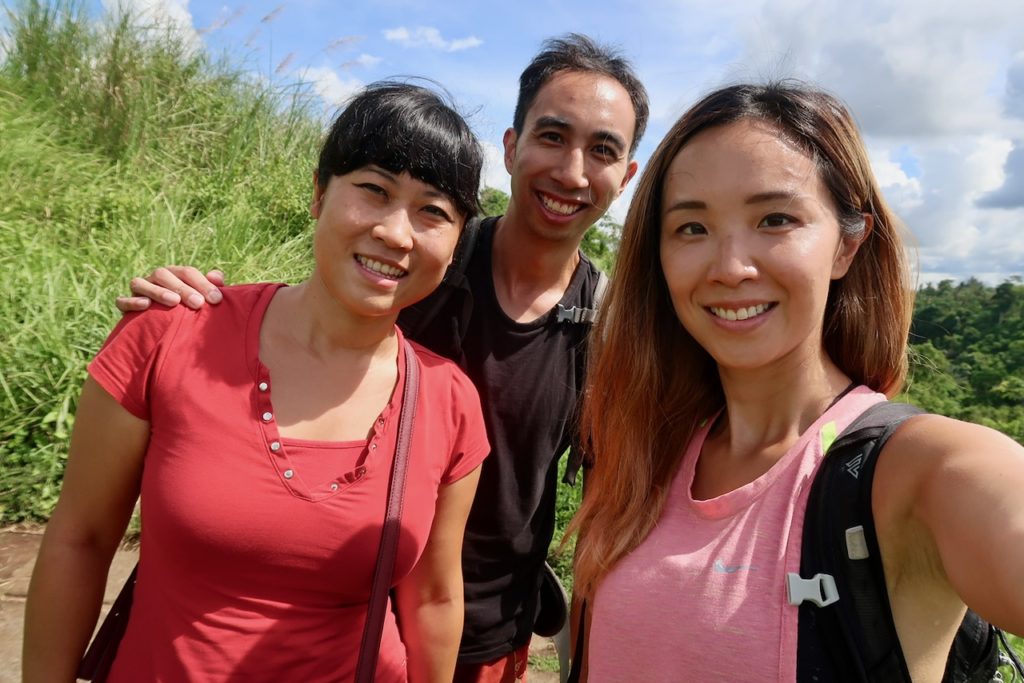
13. How do you meet people when you travel? Do you have any tips for people that are having challenges meeting people while traveling?
Clover: Since I solo travel a lot, either people get curious and they start initiating a conversation or I do! Especially if I join excursions or some kind of activities, there are lots of chances to connect. Those are better opportunities because you already have something in common with them when you are interested in the same activities. Joining communities like the FIRE community also helps tremendously. I have met up with several Chautauquans over these 2 years multiple times. In fact, Mr. & Mrs. Nomad Numbers Were hanging out in Bali back in March before Covid-19 striked!
Cost of living
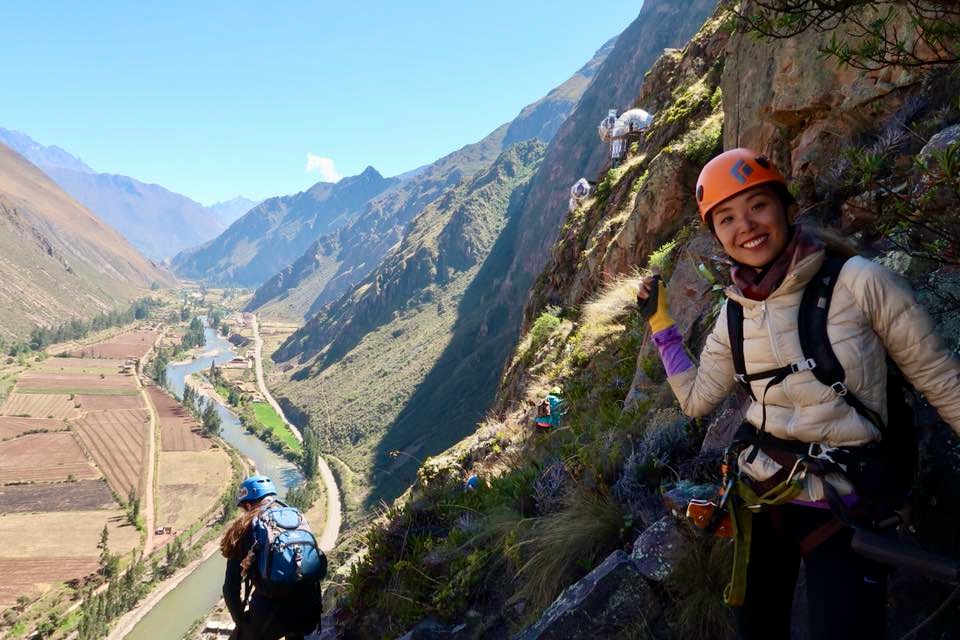
14. How much money do you spend on travel per year? How many days of travel does this represent? How much does this represent per day and per person?
Clover: When I used to travel a lot, I would stick to a budget of $1400 CAD/month, which allows me to still save $2,000 CAD a month towards my retirement. So that would amount to $15,600 CAD/year! It is hard to say exactly how many days of travel it represents because it depends on where I am going. If it’s an affordable country like south east asia, I can spend my budget for 3 weeks, but if it’s somewhere more expensive then I would either go every other month or go for a shorter period of time.
The table below provides my monthly budget breakdown per spending category.
| Spending Category | Monthly Amount (in CAD) |
|---|---|
| Accommodation | $640 CAD (or $477 USD) |
| Groceries | $350 CAD (or $261 USD) |
| Dining out / Take-out | $50 CAD (or $37 USD) |
| Activities (when traveling) Or self-development (when staying put) | $200 CAD (or $149 USD) |
| Health Care / Health Insurance | $10 CAD (or $7 USD) (when I travel) |
| Transportation | $50 CAD (or $37 USD) |
| Living expenses (Taxes, cell phone, mailbox, storage, Netflix, Audible) | $80 CAD (or $60 USD) |
| Other expenses | $50 CAD (or $37 USD) |
| Monthly Total | $1420 CAD (or $1059 USD) |
| Per Person, Per Day Total (1 month ~ 30 days) | $47 CAD (or $35 USD) |
15. What strategies have you used to reduce your expenses?
Clover:
- Selling my condo to rent a room was a huge cost saver. (from $2000 to $640 / month).
- Selling my car and now walking everywhere. (from $300 to $50 / month).
- Buying mostly experiences or self development related items. ($200 / month)
- No online subscriptions (Netflix or Spotify).
- Cooking frequently have dropped my food costs significantly. (from $800 to $400 / month)
16. How do you fund your travel (savings/work whilst traveling/other)?
Clover: When I was working as a flight attendant, it funded my travels. and allows me almost 20 days off in a month to travel on the side. The affordable flight benefit is another thing that I am very blessed with. I mostly only pay taxes on the flights so it almost acts as a built-in travel hack.
17. Is COVID-19 impacting your income stream & investment strategy? If so, what change are you planning on making?
Clover: For the time being, since I am laid off, the government assistance will provide me 1 year and 9 weeks of pay. I also have a year of emergency funds as well. I decided not to add anything to my portfolio at the moment until I start monetizing, and pivot to a 60/40 asset allocation instead of the 90/10 split that I begin with. That will buy me quite a bit of time to build my brand. In the meantime, I’m going to look for freelance jobs or coaching opportunities to hone my skills that are synergistic to my brand. Once I make a salary again, I will resume investing.
Lessons, tips & advices
18. If you will have to do it again, what would you do differently?
Clover: I actually wouldn’t change a thing. I had to go through all those “hardships” in order to arrive at the wisdom and experiences I have today. I trust that whatever happened was meant for me in perfect timing.
19. What advice do you have for others who are considering going through a life design exercise?
Clover: Try to really think about what YOU value most. Not what other people say you should do, but what YOU want and realistic for you. I sold my condo because I know that I have no problem living in a room. It doesn’t affect my level of happiness. Even during the COVID-19 lockdown. Because I value traveling and experience so much I’m ok with this “sacrifice”. So figuring that out is vital in designing a life that makes YOU happy.
20. What advice do you have for others who are considering following your lifestyle?
Clover: Do a test run to see if you like this type of lifestyle being constantly on the run. It can be draining on the body, but if you keep up your healthy habits, this lifestyle has never a dull moment.
21. What is one resource (blog, podcast, book besides your own) you recommend for those that want to pursue your lifestyle?
Clover: Millennial revolution’s blog. Since they travel nomadically and teach you how to financially build your portfolio. It’s both inspiring and practical. It is also closest to my lifestyle.
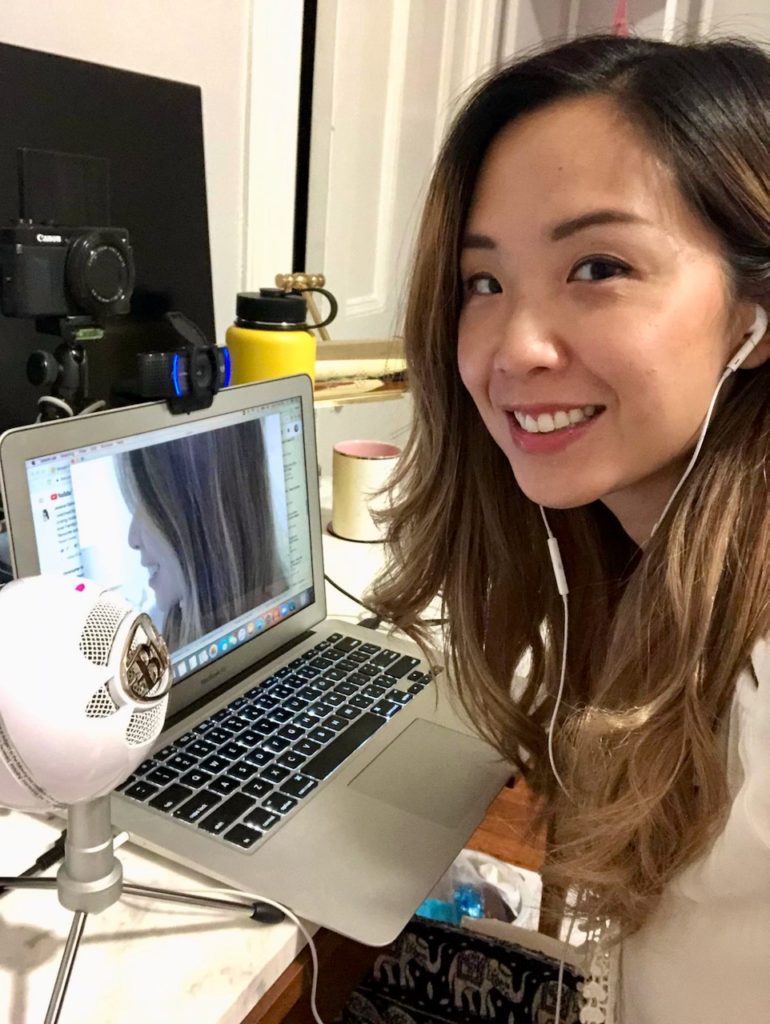
Looking ahead
22. What is next for you?
Clover: I’m hoping to build a community to guide Asians to walk a path of authenticity. My stories and struggles (which there are many more besides my divorce) have catalyzed me to live on my own terms. And I hope more people can be inspired to do the same.
Clover: Being a flight attendant can seem very glamorous, but there is also the reality of hard work and jet lag. Every airline has different standards and schedules, so I am fortunate to have a lot of time off and decent pay for my 14 years seniority and my Chinese language for more efficient long haul flying. It could differ when you first start out but being able to combine the flexibility of work schedule, plus a stable income, plus the flying benefits, can be a very lucrative way to travel the world and plan for retirement at the same time.
With the many uncertainties of the world, it’s hard to predict what the future will bring, but the best we can do is utilize what we have and make the best out of the situation. But also acknowledging the fact that this is a scary time. And it’s ok to have a range of emotions.
Rapid-fire questions
We like ending every interview asking some fun rapid-fire questions for our guests.
| What is your superpower & why? | Adaptability. I am flexible with my lifestyle providing my circumstances. This really helps me navigate life as it’s always an exciting ride with many turns. |
| What is your favorite travel destination & why? | Bali. I love the spirituality and health aspect. |
| What’s something you pack that’s not absolutely essential but you like having it? | My lightweight tripod! I tend to travel solo a lot, so It makes taking selfies a lot easier! |
| What’s the best piece of advice you’ve received? | We are all on our own path and timing. Stay in trust. |
Thank you so much Clover for sharing your transformational life design journey with us. It is quite inspiring to see how far you’ve come. We are wishing you all the best with Unconventional Asians and we’ll be cheering you along the way in the weeks, months, and years to come!

If you want to know more about Clover, you can find her on the following platforms:
- Blog: Simply Clover Living
- Facebook: Simply Clover Living
- Youtube: Simply Clover Living | Unconventional Asians
- Instagram: Simply Clover Living | Unconventional Asians
Takeaways
Here are the main lessons we took away from this interview:
- Lesson 1 – You need an awakening to fuel a major change in your life. For Clover going through and past her divorce ended up being a big wake up call for her. Instead of getting stuck with guilt and shame for divorcing at such a young age, she grew from this separation and decided to start defining a life on her own terms and manage to conquer many fears she had. For instances:
- On a financial level, Clover went from not being financially savvy to draft her own path to financial independence and make hard financial decisions (like selling her condo) because the numbers looked right, even though society told us this was wrong. She also slowly drifted towards minimalism and realized that material things don’t give her joy or fulfillment, experiences do.
- On a personal level, Clover went from not being comfortable to travel outside of Asia to being a confident solo travelers checking out places like the Peruvian Amazon Jungle, Mont Everest Basecamp, Greece (to name just a few)
- On an emotional level, Clover went from fears of many struggles in life to become comfortable being uncomfortable. This leads us to feel comfortable meeting with strangers (even as a solo Asian), or to tackle activities like scuba diving, skydiving, long-distance swimming, or even high-altitude trekking. Activities she felt she could never have done before. She later told us that she also conquered loneliness, gained confidence and self-worth because her relationship status no longer defines her. It’s about living life on her terms instead of succumbing to societal and cultural expectations.
- Lesson 2 – Following what you love is a great path to self-actualization. By going through this transformational journey, Clover becomes more than a confident solo female nomadic traveler. Through the connection she made, the experience she gained, and how much she was able to change herself, she realized that she can now help others to go through a similar transformation journey. She initially thought that the end of her journey was to become financially free and travel the world. Through this journey, she realized that this was just a starting point and she is now focusing on giving back everything she learned to people that are facing similar challenges to also let them free themselves and design a life on their own terms. This would not have happened if Clover would not have trust to follow what she loved the most.
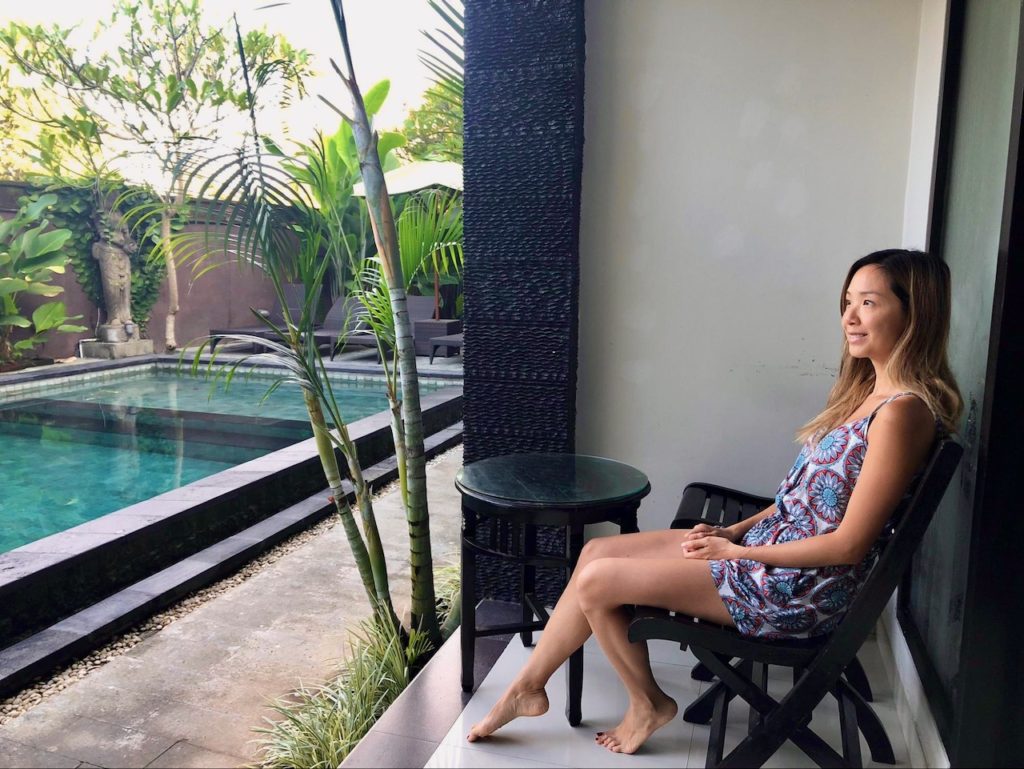
Call to action
What do you think about this story? We would love to hear from you, so feel free to share your feedback by leaving a comment below.
Sometimes we need to hear about others making unconventional decisions before we can have the confidence to make our own. If you have (or are on a path to) an unconventional journey to improve your life that has a nomadic component to it and is interested to share it, please reach out to us as we would love to consider your story for our blog.
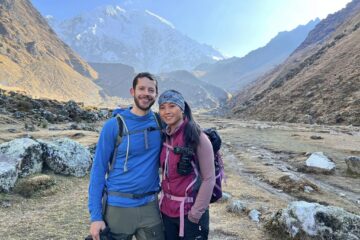
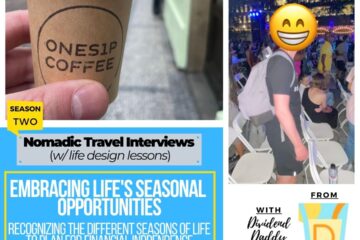
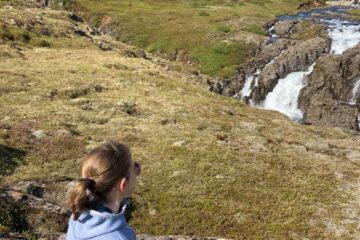
2 Comments
David @iretiredyoung · June 16, 2020 at 3:01 pm
Another inspirational interview in your series – I really enjoy reading the different approaches that people, and loved Clover’s story.
Can I ask a question of Clover? You say Bali is your favourite destination. After I FIRE’d, we (my wife and I) went on some travels and made Bali our first stop – it was where my wife really wanted to go. While I look back on our visit fondly, it didn’t quite match our expectations. I think maybe because we weren’t quite used to longer travel at that point. So I’m tempted to give Bali another shot, and would be interested to know the areas in Bali that particularly hit the spot for you…thanks.
Clover · June 24, 2020 at 3:31 am
Hi David! Congrats on being FIRE’d! Yea Bali is tricky because it is getting a bit touristy. I enjoy it because of the spirituality aspect specifically and the community there.
I like going to Sayuri healing food in Ubud for the really delicious vegetarian fare. And if you hang out in the outdoor area, there are some cool people you can meet.
I also really like Canggu to learn surfing and the many cafes there are around. Granted, I was there also to take pictures for my blog and work on my laptops so that served my purpose.
I did hear Da Nang and Sri Lanka being really nice as well with an expat community that resembles the ore Bali before it becomes so popular. But who knows what will the world look like post covid though!
Happy travelling and hope we can do that very soon! Stay safe!